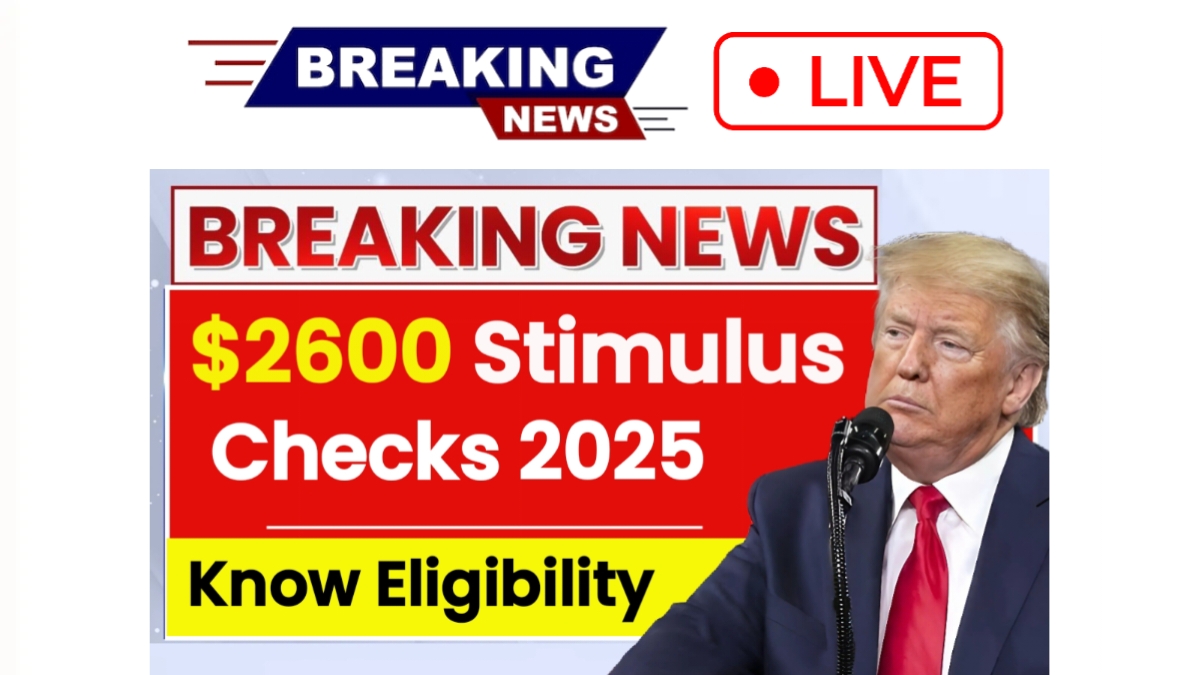$2600 Stimulus Check 2025: Recent reports circulating online have suggested that Americans might receive a $2600 stimulus check in May 2025. These claims have generated excitement among many citizens struggling with everyday expenses in today’s economy. According to these reports, the supposed payment would be an effort by the government to support citizens who are facing financial difficulties. However, before getting your hopes up, it’s important to understand the reality behind these claims and where they originate from.
Official Stance from Government Authorities
The Internal Revenue Service (IRS) and the U.S. Department of the Treasury have officially confirmed that no $2600 stimulus check is planned for distribution in 2025. These federal agencies, which handle all tax-related matters including stimulus payments, have clarified that no such payment has been approved or is in the works. This information is crucial for Americans to understand, as financial planning based on non-existent payments could lead to difficult situations for households already facing economic challenges.
How Stimulus Checks Actually Work
When the government does issue stimulus checks, the process follows a specific legal path. Any new stimulus payment must first be proposed in Congress, where it undergoes debate and must be passed into law before the IRS can distribute funds. During the COVID-19 pandemic, several rounds of stimulus payments were indeed distributed to help Americans cope with financial hardships, but these were all properly legislated through Congress. As of now, no such legislation for a 2025 stimulus payment has been introduced, debated, or passed.
Origins of the Misinformation
The rumors about a $2600 payment seem to stem from confusion between past stimulus initiatives and ongoing government assistance programs. Social media platforms and certain websites often spread this misinformation, sometimes mixing details from legitimate government programs with fabricated payment amounts and dates. This creates a false impression that new stimulus checks are imminent. The confusion is particularly problematic for vulnerable populations like seniors and low-income families who might be most in need of financial assistance.
Legitimate Assistance Programs Available Now
While the $2600 stimulus check claim is unfounded, Americans should know that several legitimate financial assistance programs continue to operate. The Earned Income Tax Credit (EITC) provides up to $7,430 for low-to-moderate income workers, distributed with tax returns. The Child Tax Credit offers up to $2,000 per child for qualifying families. Social Security and Supplemental Security Income (SSI) provide monthly payments to retired, disabled, and low-income individuals, with payment amounts varying based on individual circumstances.
Additional Support Options
Beyond these federal programs, various state-level initiatives offer financial relief to eligible residents. Many states have their own relief funds that provide up to $1,500, though eligibility requirements and distribution schedules vary by location. The Supplemental Nutrition Assistance Program (SNAP) helps low-income households purchase food, with benefit amounts adjusted based on household size. Housing assistance programs, healthcare subsidies under the Affordable Care Act, and energy assistance through the Low Income Home Energy Assistance Program are also available to help families manage their expenses.
How to Verify Government Programs
To avoid falling for misinformation about government payments, Americans should verify information through official channels only. The IRS website (irs.gov) and the Social Security Administration website (ssa.gov) provide accurate, up-to-date information about legitimate government programs. During tax season, consulting with a certified tax professional can help individuals understand what refunds or credits they might qualify for. It’s also important to be wary of scams that often proliferate around rumors of government payments, particularly those requesting personal information via email, text message, or phone calls.
Moving Forward with Accurate Information
While it’s disappointing that the rumored $2600 stimulus check isn’t real, staying informed about legitimate assistance programs is crucial for financial wellbeing. Rather than hoping for unconfirmed payments, eligible Americans should explore existing programs for which they qualify. These established initiatives continue to provide vital support to millions of citizens across the country. By focusing on verified information from trustworthy sources, Americans can make sound financial decisions based on reality rather than rumors.



